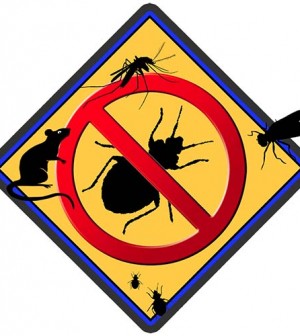- 4 Unexpected Things I’ve Learned From Buying My First Mobile Home Park
- How Ironic: America’s Rent-Controlled Cities Are Its Least Affordable
- U.S. homes are still a bargain on the international market
- Getting The Best Possible Quality Photos On MLSs and Syndicated Sites
- Home buyers in these markets have the upper hand
#1 Most Feared Pest in Apartment Renter Survey

A new survey of apartment residents reveals two key findings about the most common and most feared pests inside apartments: flies are the most common pest cited in apartments and bed bugs are the most feared.
Most Common Pest: Flies
Eighty-five percent of survey respondents said they have encountered a pest in the past year and flies were the most common, followed by ants, cockroaches and rodents. While flies may appear harmless, they can, every time they land, leave behind thousands of germs that can cause serious illnesses such as diarrhea, food poisoning, meningitis and bloodstream infections.
“Many may not be aware that house flies are absolutely filthy – in fact, twice as filthy as cockroaches. The survey results we released earlier this summer show that the health threats flies pose are often underestimated,” says Orkin entomologist and Technical Services Director Ron Harrison, Ph.D. “It’s important that everyone understands the magnitude of these health threats so that they can help prevent the transmission of dangerous diseases and bacteria.”
To prevent fly activity, apartment residents should:
- Remove trash and wipe countertops regularly.
- Clean food and beverage spills immediately.
- Submit a maintenance request for any cracks and crevices on the building exterior, as well as missing or broken door and window screens.
Most Feared Pest: Bed Bugs
Thirty-nine percent of survey respondents stated they would least like to see bed bugs in their apartment, followed by rodents, cockroaches, ants and flies.
Bed bugs feed only on blood and some people who are bitten experience itchy red welts and swelling. Bed bugs are not only in bedrooms, but can settle wherever people sleep. They are great hitchhikers and travel in personal belongings and luggage.
“Bed bugs can reproduce quickly, so it’s important that apartment residents notify property managers of any evidence that causes them to suspect bed bug activity,” says Paul Rhodes, National Maintenance and Safety Instructor of NAAEI. “Early detection is key to help prevent a much larger infestation from setting in. To help prevent their occurrence, properties can be active in removing furniture abandoned at onsite trash locations, and ensure that residents are aware of dangers associated with bringing home ‘found’ items.”
Unlike with other pests, sanitation is not an influential factor in bed bug infestations. For this reason, it is important that apartment residents practice vigilance within their apartment units, as well as when they travel, by following these steps:
- Lift and look underneath the mattress, bed frame, headboard and furniture. Watch for live or dead bugs or tiny rust-colored spots.
- When travelling, elevate luggage on a luggage rack away from the bed and wall.
- Examine luggage carefully while repacking and upon returning home from travelling.
- Place all clothing from travel luggage in the dryer immediately for at least 15 minutes at the highest setting permitted for the items upon returning home.
Earlier this year Orkin released a list of Top Bed Bug Cities, ranked by the number of bed bug treatments Orkin performed from January to December 2013:
1. Chicago
2. Los Angeles
3. Columbus, Ohio
4. Detroit
5. Cincinnati
6. Cleveland/Akron/Canton
7. Dayton
8. Washington D.C.
9. Denver
10. Indianapolis
11. Richmond/Petersburg, Va.
12. Raleigh/Durham/Fayetteville, N.C.
13. Dallas/Ft. Worth
14. Syracuse, N.Y.
15. Atlanta
16. Houston
17. New York
18. Seattle/Tacoma
19. San Francisco/Oakland/San Jose
20. Boston
21. Milwaukee
22. Miami/Ft. Lauderdale
23. Nashville
24. Pittsburgh
25. Charlotte
26. San Diego
27. Baltimore
28. Phoenix
29. Cedar Rapids/Waterloo, Iowa
30. Charleston/Huntington, W. Va
31. Knoxville, Tenn.
32. Louisville, Ky.
33. Grand Rapids/Kalamazoo, Mich.
34. Hartford/New Haven, Conn.
35. Champaign/Springfield, Ill.
36. Greenville/Spartanburg/Asheville, S.C.
37. Omaha, Neb.
38. Buffalo, N.Y.
39. Lincoln/Hastings/Kearney, Neb.
40. Lexington, Ky.
41. Sacramento/Stockton/Modesto, Calif.
42. Colorado Springs/Pueblo, Colo.
43. Albany/Schenectady/Troy, N.Y.
44. Minneapolis/St. Paul
45. Honolulu
46. Toledo, Ohio
47. Peoria/Bloomington, Ill.
48. Davenport, Iowa/Moline, Ill.
49. New Orleans
50. Kansas City
To help reduce pest activity, apartment renters should also report pest sightings immediately to their property manager and request educational materials from their property manager to learn more about their role in pest control.
The survey was released by Orkin, polling apartment renters across the United States. For the full results of the apartment renter survey, visit Orkin.com.
About Orkin, LLC
Founded in 1901, Atlanta-based Orkin is an industry leader in essential pest control services and protection against termite damage, rodents and insects. The company operates more than 400 locations with almost 8,000 employees. Using a proprietary, three-step approach, Orkin provides customized services to approximately 1.7 million homeowners and businesses in the United States, Canada, Mexico, Europe, South America, Central America, the Middle East, the Caribbean, Asia, the Mediterranean and Africa. Orkin is committed to studying pest biology and applying scientifically proven methods. The company collaborates with the Centers for Disease Control and Prevention (CDC) and eight major universities to conduct research and help educate consumers and businesses on pest-related health threats. Learn more about Orkin at http://orkin.com. Orkin is a wholly-owned subsidiary of Rollins Inc. (NYSE: ROL).
About the National Apartment Association
The National Apartment Association (NAA), currently celebrating its 75th anniversary, is America’s leading advocate for quality rental housing. NAA’s mission is to serve the interests of multifamily housing owners, managers, developers and suppliers and maintain a high level of professionalism in the multifamily housing industry to better serve the rental housing needs of the public.




 100% Secure
100% Secure
You must be logged in to post a comment Login